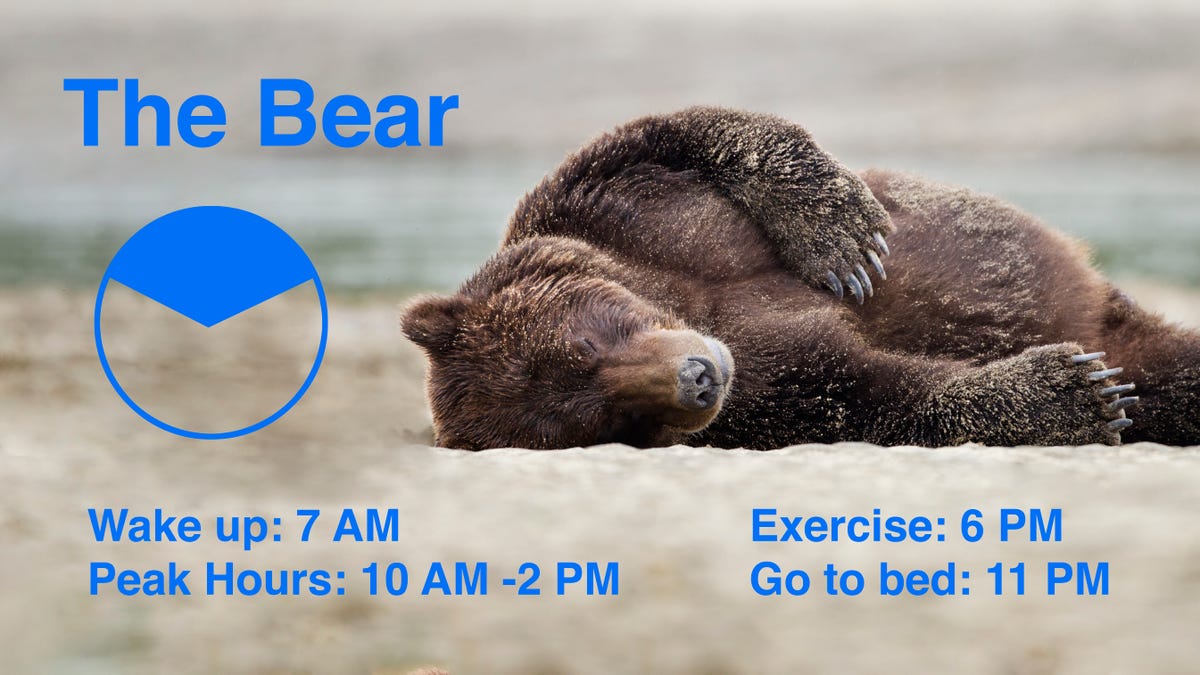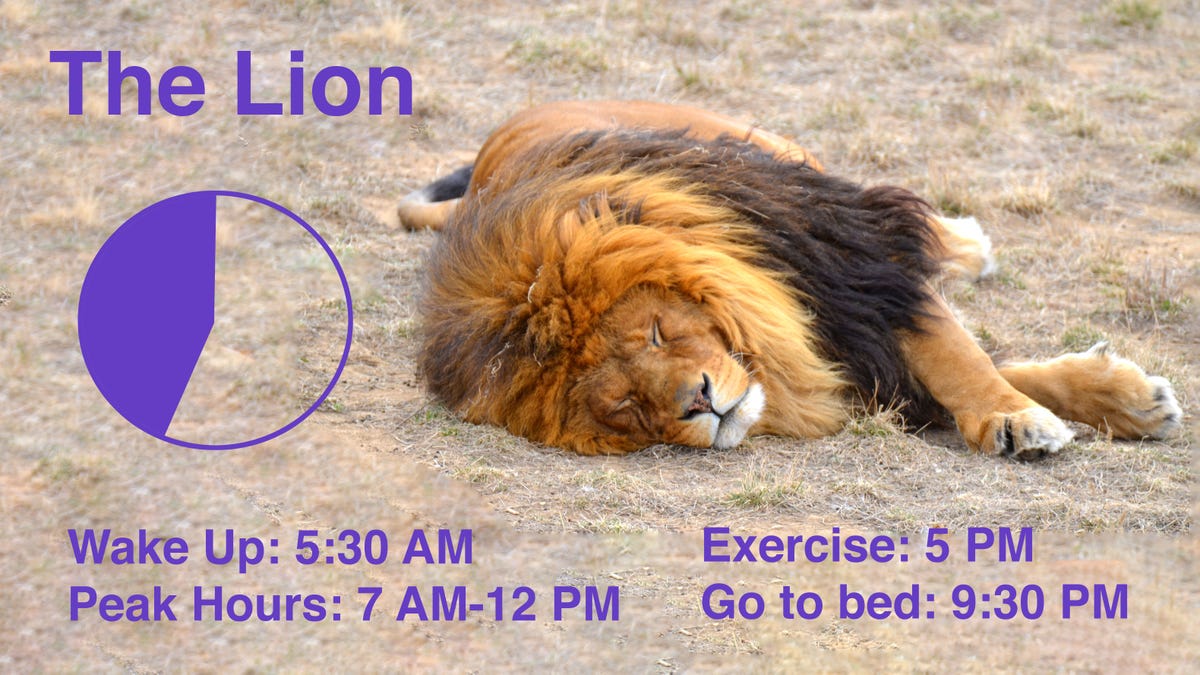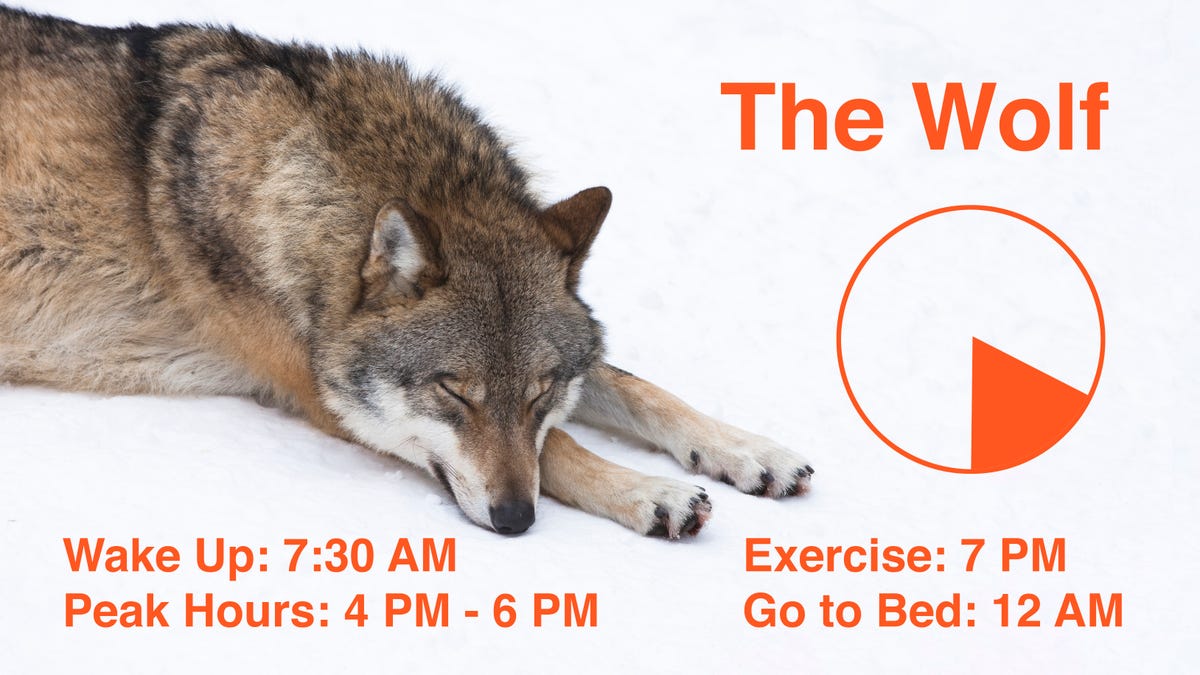
Let’s be honest. If you’ve come here, chances are you’re looking Means to sleep better. You tried it melatoninto season you nightly routine and even wake up early hoping to get rid of you insomnia. But what if your body naturally prefers a different daily schedule? This happens because everyone is programmed to function better during different peak hours.
People fall into different groups, known as chronotypes, based on their… the body’s natural preference for morning or evening. Chronotypes are divided into four groups: bear, dolphin, lion and wolf. The names of these groups are all related to the animal’s natural sleep-wake cycle. Knowing your chronotype can help you sleep better. Here’s what we know.
What is a chronotype?

Your chronotype determines when your body feels like falling asleep and waking up during the day. This may sound familiar, and some even call it ‘ circadian rhythm – a term for the body’s internal clock. So you might be wondering: are they the same? Simply put: not quite.
Think of your circadian rhythm as your 24-hour physiological cycle, while your chronotype is your natural or preferred biological behavior during those 24 hours, such as sleeping, eating and productivity levels at certain times of the day.
Research shows that your chronotype determines your cognitive and physical peak performance during the day. Understanding your internal clock can help you optimize your daily schedule and activities to use your time more efficiently and even increase productivity.
The four animal chronotypes
We all know the terms ‘early bird’ and ‘night owl’. Well, there is some truth in that. The four chronotype groups – bear, dolphin, lion and wolf – are all linked to that animal’s sleep-wake cycle and can also shed light on human behavior.
We’ll dive into the common features and the ideal schedule for each, to help you maximize your productivity and help you catch those zzzs. The following descriptions for each chronotype are based on the book by bestselling author and board-certified sleep specialist Dr. Michael Breus, The power of when.
The bear chronotype

People with this chronotype follow the rising and setting of the sun. Bears spend most of their day awake and are near the middle in terms of sleep-wake schedules. In terms of productivity, bears are most productive in the late morning and early afternoon.
If you’re reading this, chances are you fall into this chronotype. According to Dr. Breusapproximately 50% of the adult population falls under the bear chronotype. It’s easy to see how this group dominates our social calendars, even though they make up more than half the population.
The chronotype of the lion

The lion chronotype is the definition of “early bird”: lions feel their best when they wake up early in the morning and finish their to-do list for the afternoon. The lion chronotype wakes up with a lot of energy. You know, that one person who is suspiciously happy at six in the morning? Yes, probably a lion. If you belong to this group, it is best to schedule important meetings or activities before noon. Although lions spend most of the early day with high energy, they often feel exhausted and have difficulty concentrating by midday. About 15% to 20% of people identify with this chronotype.
The Wolf chronotype

If you consider yourself a “night owl” and get those energy spikes after everyone else has settled down, you’re probably the wolf chronotype. Like a real wolf, this chronotype is known to do most of its activities late in the day. Wolves like to stay up late and have trouble waking up early. For this reason, the wolf has difficulty sticking to a typical nine-to-five work schedule. The wolf’s productivity peaks from noon to 4 p.m. and peaks again around 6 p.m. About 15% to 20% of the population falls into this chronotype.
The dolphin chronotype

If you have trouble falling asleep, waking up, or following a structured sleep schedule, you most likely have the dolphin chronotype. Of all chronotypes, this is the rarest: approximately 10% of the population identifies with the dolphin chronotype. Dolphins often find it difficult to stay asleep as they are very sensitive to external factors such as noise and light and are likely to be diagnosed with insomnia. These people are also common sleep less than the recommended eight hours. The good news is that they have a wide productivity window. Dolphins feel most productive between 3:00 PM and 9:00 PM
What is my chronotype?
According to one study, chronotype is influenced by many factors such as age, gender, environment and even genetics. The same study found that “on average, women had chronotypes earlier than men until age 40, but later thereafter.” Teenagers tend to identify with later chronotypes, while adults are likely to shift to an earlier chronotype as they age.
The easiest way to find out what your chronotype is is to take a chronotype quiz:
- MEQ self-assessment: The morning-evening questionnaire has a total of 19 questions and an allocated number of points for each answer. At the end of the quiz, add the total for your score. Based on that number you will be classified into the morning type, the evening type or the intermediate type.
- AutoMEQ: This is the computerized version of the Morningness-Eveningness Questionnaire. You’ll answer the same 19 questions about your daily sleep-wake habits, and you’ll receive personalized feedback once you’re done.
- The power of When Quiz: This chronotype quiz was designed by the Sleep Doctor himself, Dr. Breus. The main purpose of this quiz is to determine your chronotype so you can work with your body’s natural cycle.
How to work with your chronotype for better sleep and productivity
Not everyone runs at the same ‘biological time’. Therefore, many of our school or work schedules are out of sync with our chronotype. This can cause a misalignment between our internal clock and sleep-wake schedule, especially on weekdays. Research shows that ‘social jet lag’ or switching schedules between the school or work day and the weekend can negatively impact your health as it is linked to metabolic disorders, obesity, diabetes and even cardiovascular disease.
Understanding your chronotype can be a game changer sleep better and increasing productivity. Knowing what time of day your body naturally feels more energetic can help you organize your daily schedule around your peak hours.
Below you will find a list of the ideal daily schedules for each chronotype according to Dr. Breus.
Ideal daily schedule for bears:
- Wake up: 7am
- Breakfast: 7:30 am
- Peak hours: 10am to 2pm
- Lunch: 12 noon
- Exercise: 6 p.m
- Dinner: 7:30 PM
- To bed: 11 p.m
Ideal daily schedule for lions:
- Wake up: 5:30 am
- Breakfast: 6 am
- Peak hours: 7am to 12pm
- Lunch: 12 noon
- Exercise: 5 p.m
- Dinner: 6:00 PM
- Bedtime: 9:30 PM
Ideal daily schedule for wolves:
- Wake up: 7:30 am (using four alarms)
- Breakfast: 8:00 am
- Lunch: 1:00 PM
- Peak hours: 4:00 PM to 6:00 PM
- Practice: 7:00 PM
- Dinner: 8 p.m
- To bed: 12 noon
Ideal daily schedule for dolphins:
- Wake up: 6:30 am
- Breakfast: 7:30 am
- Peak hours: 3:00 PM to 9:00 PM
- Lunch: 12 noon
- Exercise: 6 p.m
- Dinner: 7:30 PM
- To bed: 11:30 PM
Too long, didn’t read
Your chronotype can tell you a lot about your body’s natural sleep-wake cycle. However, while these types can give you an idea of your ideal schedule, they can vary from person to person or even change over the life of the same person. Whether you’re a bear, lion, wolf, or dolphin, understanding your chronotype can help you maximize productivity, get a good night’s sleep, and even improve your overall quality of life.
For more sleep tips: Home remedies for insomnia And Melatonin makes you dizzy, try this sleep Supplements instead
Leave a Reply